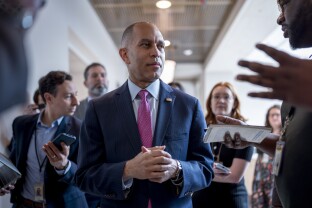House Minority Leader Hakeem Jeffries said in a letter to Democrats on Friday that his caucus has no intention of going along with the House GOP’s plan to fund the government with a continuing resolution until October.
With funding running out in a week, Jeffries’ position raises the prospect of a shutdown. Republicans intend to put a continuing resolution on the floor next week that would extend current funding for the rest of the fiscal year, after lawmakers have repeatedly failed to agree on new spending levels.
“Republicans have decided to introduce a partisan continuing resolution that threatens to cut funding for healthcare, nutritional assistance and veterans benefits through the end of the current fiscal year,” Jeffries wrote in a “Dear Colleague” letter on Friday. “That is not acceptable.”
Jeffries and Democrats wanted assurances in the next government funding bill that President Donald Trump and Elon Musk couldn’t simply defund programs and agencies that Congress has funded. Republicans not only balked at that demand, but they wanted to make it easier for the Trump administration to block funds that Congress had approved.
Neither party is expected to get exactly what it wants in the CR, but Democrats are sounding the alarm that simply extending government funding without provisions that prevent the president from blocking money means that Republicans are essentially turning over the power of the purse to the executive branch.
“House Democrats would enthusiastically support a bill that protects Social Security, Medicare, veterans health and Medicaid, but Republicans have chosen to put them on the chopping block to pay for billionaire tax cuts,” Jeffries wrote. “We cannot back a measure that rips away life-sustaining healthcare and retirement benefits from everyday Americans as part of the Republican scheme to pay for massive tax cuts for their wealthy donors like Elon Musk.”
“Medicaid is our redline,” Jeffries wrote.
Cuts to Medicaid look to be a major part of the GOP’s upcoming reconciliation bill, and Democrats would like to make those cuts more difficult.
While Democrats are opposing the current plan to fund the government for the rest of the fiscal year with a CR, Jeffries stopped short of endorsing a shutdown. Democrats told NOTUS this week that they would like to keep the government’s lights on, and even though they’re at odds with Republicans on how to fund the government, they would like to keep negotiating — a point which Jeffries nodded to in his letter.
“The top Democrat on the Appropriations Committee, Rosa DeLauro, remains ready to negotiate a meaningful bipartisan spending agreement that puts working people first,” he wrote.
Jeffries added that the Democratic Caucus would reconvene early next week to discuss “any matter related to the March 14 deadline.”
Of course, Republicans are banking on at least some Democrats supporting a CR until October. They think that, if they can limit defections from their own party, at least a handful of Democrats will come along and they’ll be able to pass the CR.
And Republicans think, if they can get their CR out of the House with some Democratic support, it would be difficult for Senate Democrats to block the legislation. (Several Senate Democrats would have to vote for the CR for the bill to overcome the filibuster’s 60-vote threshold.)
Still, Senate Democrats have been similarly steadfast that their caucus won’t support a CR for the rest of the fiscal year — at least not one that neglects to make sure Trump can’t just halt funds that Congress already approved.
Senate Minority Whip Dick Durbin told reporters this week he doesn’t think there’s support among Democrats in his chamber for a CR that goes until October.
“If the CR ends up repeating a spending pattern that may not even be existent, it’s wasteful,” Durbin said.
—
Tinashe Chingarande is a NOTUS reporter and an Allbritton Journalism Institute fellow.
Sign in
Log into your free account with your email. Don’t have one?
Check your email for a one-time code.
We sent a 4-digit code to . Enter the pin to confirm your account.
New code will be available in 1:00
Let’s try this again.
We encountered an error with the passcode sent to . Please reenter your email.


